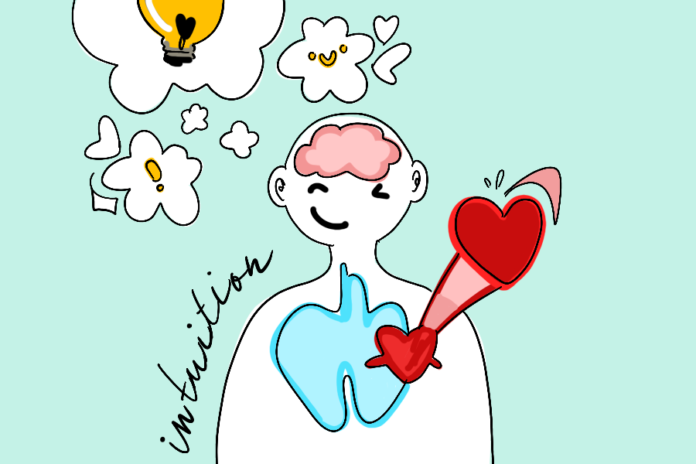The psycho-biological reasons why you should trust your gut
By MAYA KORNYEYEVA — mkornyeyeva@ucdavis.edu
I’m sure you have heard the sayings “Trust your gut” or “You’ll know it when you see it.” But what exactly are you trusting? What exactly are you supposed to know when you see something?
A flash of inner insight, like a butterfly in the stomach or an invisible hand on your shoulder, is the physical feeling many people describe as a “gut feeling.” This gut feeling is known as intuition or instinct and is an amalgamation of neural and chemical signals that you process subconsciously, and which your body creates a reaction to.
These “aha” moments usually occur when your “conscious mind finally learns something that your subconscious mind had already known,” a research article published by Russell Futcher states.
In fact, the psychology behind intuition is incredibly fascinating. When you feel intuitive conviction about something, what occurs is a form of pattern recognition where your brain creates an association between current and past events. In this way, the brain functions as a predictor of sorts, since it uses the identified patterns to generate information about expected events and outcomes.
Once you are placed in a situation that coincides with a pattern your brain identifies, you get that feeling of intuition: your body predicts something about the situation faster than you could consciously come around to that conclusion.
For me, intuition often strikes when I am forced to choose between many options, such as a color scheme for my next digital poster or when I am stuck between going out with friends versus staying in. My intuition tends to guide me to the decisions I make, often without consciously being aware of it — a collection of pink hues for my design feels “just right,” and going out with friends feels like “what I need to do” at the moment.
In other situations, intuition can be used to judge the trustworthiness of an individual that you are meeting for the first time or to assess a situation that could be potentially dangerous. Suppose something about your new coworker seems off the moment you first talk to them. In that case, that could be your body picking up on emotional or physical cues you need to pay attention to. On the other hand, if you’re about to jump a fence or walk through a sketchy area, your gut feeling can warn you that this may not be the best idea.
Intuition can be incredibly useful for making fast decisions. But not every off-hand thought or moment of anxiety is intuition. Being able to recognize when you are feeling the presence of intuition is something that can only be relied on and developed through experience.
One way to do so is to pause and reflect on your situation whenever you are struck with a “gut feeling”: is it a positive emotion, or a negative one? What may have prompted that feeling given your current situation? What kind of patterns could you have subconsciously noticed? Asking these questions can be critical, allowing you to develop a better quality of pattern recognition and to know when your gut feeling should be trusted.
I argue that, in most –– if not all –– cases, you should trust your intuition. Decision-making in any situation can be stressful, and allowing yourself to be guided by your intrinsic senses can help relieve some of that stress and create a deeper connection with your intuitive self.
Especially when it comes to danger or your own personal health, these gut feelings are your body actively warning you against something. Perhaps it’s that migraine that just won’t go away or a cold that you think might not be “just a cold” anymore; either way, embracing your intuitive feelings rather than pushing them aside may be a choice that not only empowers you to make decisions but also stops you from overthinking.
Rather than agonizing over a choice or event, why not practice listening to what your gut is telling you? Over time, training your intuition can lead you to make faster and stronger choices that coincide with your moral compass and personal self. Listening to your body while also relying on logical, situational thinking will help you avoid second-guessing yourself and, more often than not, make the right choice.
Written by: Maya Kornyeyeva — mkornyeyeva@ucdavis.edu
Disclaimer: The views and opinions expressed by individual columnists belong to the columnists alone and do not necessarily indicate the views and opinions held by The California Aggie.









